
views
Take a 5-15 minute break.
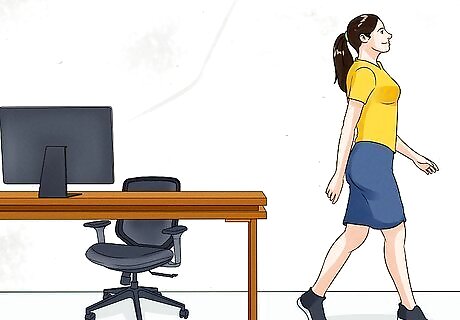
If you find yourself losing motivation, take a moment to step away. If you’re working on something that requires hours of work and commitment, a break can provide a much-needed vacation for your brain. Take a 10-minute walk around the block, meditate at your desk for 5 minutes, or do a few simple stretches. When you return, you'll feel refreshed and ready to tackle your work. Go outside for a few minutes. A change of scenery can work wonders in restoring your alertness. Take a snack break if you’re drained of energy and your stomach is growling. Choose something with healthy nutrients, like walnuts, to give your brain a boost.
Get at least 7 hours of sleep every night.

Set a bedtime routine, even if you think you’re too old for that. You need at least 7 hours of sleep each night to rest your mind and body. Pick a bedtime and start winding down about an hour before that. Take a hot shower, read a book, or drink some hot tea. Getting plenty of sleep will have you waking up feeling alert and ready to take on the day each morning! If you've ever woken up feeling cranky after staying up late, it could be because your rapid eye movement (REM) sleep cycle was interrupted. During this cycle, your mind sorts information and stores memories. Disrupting that can leave you feeling distracted and impatient.
Exercise regularly.
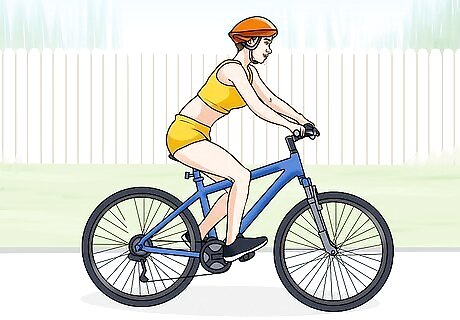
Exercise at least five times a week to improve alertness. Consistent exercise increases the blood flow to your brain, which provides the brain with more energy and oxygen. This enhances your cognitive functions, including memory, concentration, and mental alertness. Aim for 30 minutes of moderate-intensity exercise, like jogging or bike riding, five times a week.
Get up and move around every 30 minutes.
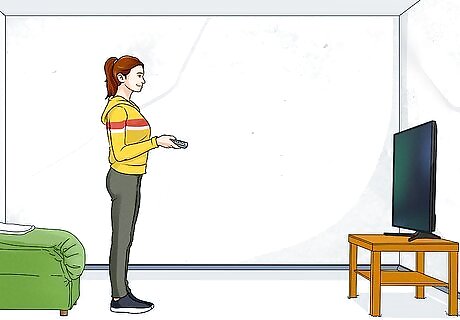
Sitting for long periods slows circulation, which zaps your energy. If you have to sit for extended periods during the day, get up and stretch every 30 minutes to get your blood flowing again. You can also try using a standing desk at work if taking a movement break every 30 minutes doesn't work for your schedule. Get creative to add more movement to your life. Stand up while watching TV at home or go on a walk with your coworkers for a meeting instead of staying in the office.
Take a few deep breaths to recenter yourself.

Deep breathing is a great way to alleviate stress and help you focus. Fill up your lungs with air, letting your chest and belly rise, and allow your abdomen to fully expand. Then, slowly exhale through your mouth. Keep taking deep breaths in and out until you feel recharged. For best results, practice deep breathing exercises for 10-20 minutes every day.
Play some upbeat music.
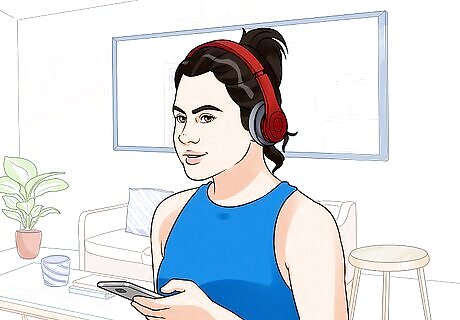
Music can stimulate memories and increase your ability to focus. Ever listen to an old song and feel like you’ve been transported right back to middle school? That’s no accident! According to Johns Hopkins Medicine, music improves memory function and engages your brain. Next time you’re feeling drained and unable to focus, turn on the radio and listen to some tunes.
Stay hydrated.

Drink 11.5 cups (2,700 mL) to 15.5 cups (3,700 mL) a day. In addition to the numerous and necessary health benefits of drinking water, it improves your brain function and keeps you feeling energized. Dehydration leaves you feeling tired and reduces your energy level. Take a water bottle everywhere you go and take a sip (or two) every time you’re thirsty to stay focused. Use a reusable water bottle if you struggle to drink enough water throughout the day.
Eat several small meals a day instead of 3 big meals.

Small, frequent meals help your metabolism work more efficiently. This helps your body utilize all the nutrients in your food for fuel! Try eating 6 small meals a day instead of 3 big meals. Ever eaten a giant meal and felt like you had to lie down the rest of the day? It wasn't in your head! Overeating can leave you feeling lethargic and distracted and contributes to stress in the long term. Avoid eating close to bedtime so that you don't disrupt your sleep.
Eat a diet rich in essential fatty acids.

Including Omega-3s and other fatty acids in your diet can improve cognitive function. More research is needed, but studies show that including Omega-3 fatty acids in your diet improves brain health and even decreases your risk of developing Alzheimer’s disease and dementia. Eat baked fish, like salmon and trout, to incorporate this healthy vitamin in your diet. You can also try nuts and seeds like chia seeds, flaxseeds, and walnuts to get a healthy dose of Omega-3s.
Take breaks from social media.

Constant access to the internet makes it hard to concentrate. Though it’s great to have so much information at your fingertips, it can really feel like too much sometimes! Try limiting yourself to 30 minutes a day and see if you start feeling more alert in your daily life. Consider a full-on break if certain apps are causing you a lot of stress! 30 days of no Instagram may really help you focus on what’s important or at least help you develop a healthier relationship with the site. A study published by the American Psychological Association shows that spending too much time on social media, especially during social events like dinner with friends or family, causes you to enjoy the moment less and struggle to remain present.
Focus on the present through meditation.
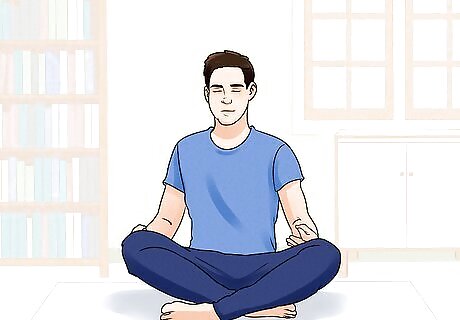
If you're distracted by your thoughts, try meditation. Meditation helps you regain your focus by returning to the present moment. Both of these help you take back control of your thoughts and remain alert! To start, try sitting in a comfortable space for 5 minutes. Close your eyes and take deep breaths. Focus on only your breaths, letting your thoughts come and go without attachment. Try 5 minutes of meditation and move on to 10-20 as you get more comfortable.
Try crossword puzzles and other fun brain teasers.

Games like crossword puzzles or Sudoku can improve your focus. Regular participation in crossword puzzles, for example, has been linked to a decreased risk of developing dementia later in life. The findings suggest that activities like these exercise your brain, providing mental stimulation and improving alertness over time. Think of it as a brain workout! If you don't have a newspaper subscription, try downloading crossword apps on your phone or tablet.
Perk up with a little caffeine.
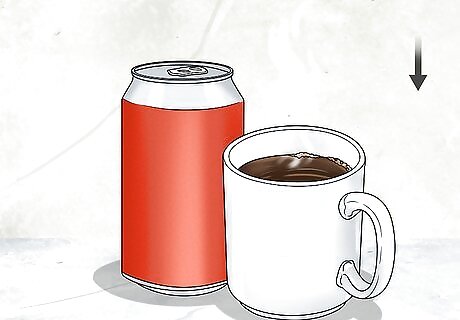
Use caffeine in moderation, though. Coffee and energy drinks can really help boost your energy, but drinking too much can disrupt your sleep. Limit yourself to one cup of coffee in the morning, and don't drink any caffeinated beverages after 2:00 pm. Switch to tea in the afternoon if you need a refreshing, hot beverage. Caffeine can keep you up into the wee hours of the night if you drink it too late. If you're especially sensitive to caffeine, don't have any after 12:00 pm. Due to the effects of caffeine withdrawal (fatigue and irritability), consider cutting back gradually. If you have three cups a day, for example, limit yourself to one cup in the morning instead.
Limit your intake of alcohol.
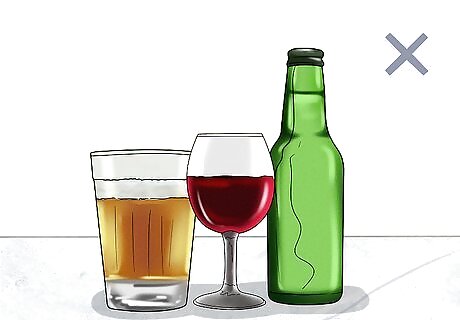
Alcohol affects your sleep, which disrupts your concentration. Alcohol is a central nervous system depressant, and studies show it can make you sleepy with consistent use. To increase alertness, limit the number of alcoholic drinks you consume. When you're out with friends, for example, stick to 1-2 drinks. Recreational drugs and cigarettes can also affect your ability to stay alert. Though they may help you focus in the short term, long-term use can leave you feeling lethargic and distracted.
Diffuse essential oils in the room.
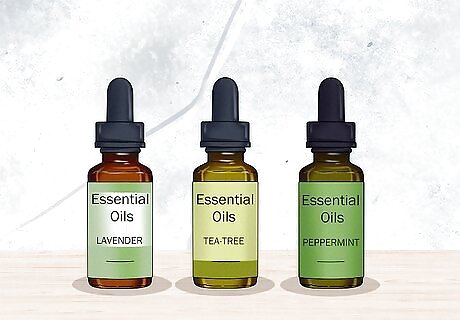
Some studies show that essential oils can boost your alertness. According to the National Institute of Health, smelling oils can stimulate the smell receptors in your nose. This can positively affect your mood, as the smell sends a chemical message to your brain’s limbic system. A study published in the International Journal of Neuroscience found that smelling peppermint can improve your memory and cognitive function. For increased alertness, smell peppermint and citrus scents like lemon. Essential oils are potent and can cause skin reactions to those with sensitive skin. It’s best to smell them rather than applying them to the skin directly. Use a diffuser to disperse the essential oil into the air. Although some studies support the use of aromatherapy for alertness, more research needs to be done to determine its efficacy and limitations.


















Comments
0 comment